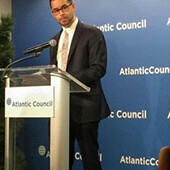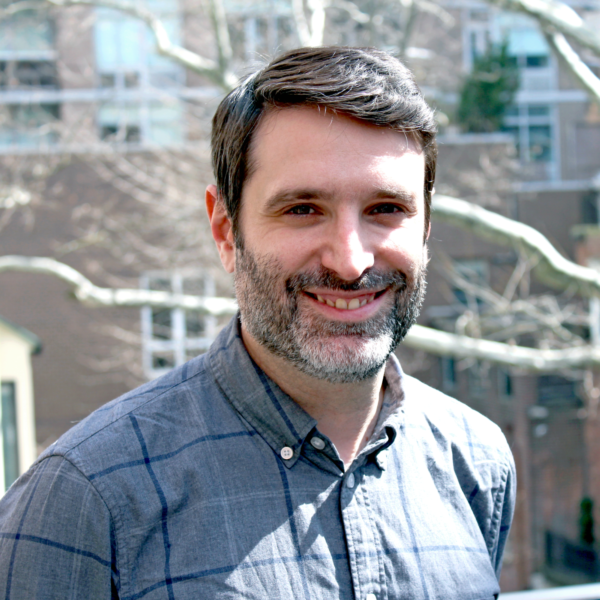U.S. Air Force veteran Jayson Browder discusses his work at Veterans in Global Leadership, which helps veterans become tomorrow's leaders. He also talks about the dishearteningly low percentages of veterans at elite schools and on Capitol Hill, and No One Left Behind, which lobbies for U.S. visas for Iraqi and Afghani interpreters.
ALEX WOODSON: Welcome to the Carnegie New Leaders Podcast. My name is Alex Woodson.
Today Jayson Browder is returning. Jayson is a veteran of the U.S. Air Force who served in Iraq. He is a former Fulbright Fellow in Turkey and a former Capitol Hill staffer. Currently he is a Presidential Management Fellow and the founder of Veterans in Global Leadership, which focuses on training, preparing, and launching veterans to become tomorrow's global leaders.
Thank you for coming, Jayson.
JAYSON BROWDER: Thanks for having me, Alex. It's wonderful to be here again.
ALEX WOODSON: The last time we talked was about 13 months ago, right around the launch of Veterans4Diplomacy, which is now Veterans in Global Leadership. Could you give us an update on the organization?
JAYSON BROWDER: When I was here last year, the organization, as you mentioned, was Veterans4Diplomacy, now changed to Veterans in Global Leadership. Actually much hasn't changed as far as the mission, but the name itself changed to be more inclusive to what we believe veterans can do in society as far as having an impact. They can do that in policy, they can do that in government, they can do that in NGOs, but they also can do that in the private sector. That was a main push coming out for the second year of the fellowship.
ALEX WOODSON: How did the first year go? How did the first class of fellows turn out?
JAYSON BROWDER: It was amazing. We had 14 student veterans in the year-long fellowship. It was actually hosted at my school, New York University Wagner School of Public Service. We had a mix of enlisted and officers from all branches of service. They have now gone on. Two have become Presidential Management Fellows as well. One is at the National Counter-Terrorism Training Center. The other one is at the White House. We actually had three become Carnegie New Leaders here at the Carnegie Council. One is a Boren Scholar to Jordan.
So within the first year we have had tremendous success. I think it's really a testament to the supporters and advocates everywhere, from General Petraeus to General Michael Hayden. And also, it's a testament to the talent of the student veterans and how hard they have worked this past year. As I mentioned, 14 came through in the first class.
This second year we have actually expanded. So we are now not just in New York City, but we're also in Washington, DC. We are at the Elliott School at George Washington University. This year we had 31 fellows from across the country, all the way from Washington State, California, Texas, and Nebraska.
We are just really excited about the future of not just the organization itself but the veterans who are becoming a part of this.
ALEX WOODSON: So what have you personally learned in the past year of running this organization?
JAYSON BROWDER: One, that it's very difficult. This is the first time ever running a non-profit. I think some of the skills that the military teaches and instills is (1) an eagerness to learn, rapid adaptability, and (2) to take risks. When I spoke to people very close to me about starting a non-profit, I think most people had quietly asked me to think of something else. But it's something that I've jumped in face, head, feet first, and it has been quite successful.
And it's not just necessarily me. The veterans' community is very vibrant, it's very strong. The men and women who served our nation abroad, they have all come back and they are all looking to take on leadership positions. When I spoke to many of my colleagues about what this program and organization would look like, I just had multiple, multiple people volunteer to help. That's what has been its success.
ALEX WOODSON: Just looking at veteran issues more broadly, one thing that I know you've been thinking about is the lack of veterans at elite schools in the United States. There was a recent New York Times article that noted as of 2015 Yale had four veterans, Princeton had one, Williams had one, Duke had two—lots of other numbers that we can go through. On the website of the Ivy League Veterans Council, they add more detail: As of 2013 in the top 20 universities the number of student veterans on average represent less than 1.1 percent of the total student population.
So why is this happening, in your opinion?
JAYSON BROWDER: It's quite incredible what's happened in over a decade since we've been at war. You would think that these veterans that have served our country bravely and have been asked to do an enormous amount and have done exceptionally well and had great impact across the globe, that their transition would be fairly easy, or there would be a better bridge into something you would think as simple as getting into a top university in the United States.
A lot of these universities get a significant amount of support from the federal government. All the donations are tax-deductible.
The New York Times article mentions that these universities have great recruitment tools. They can recruit football players and they can recruit physics professors. It's quite embarrassing that there are so few veterans at these universities. I think the critical point here is that veterans, especially the post-9/11 veterans that have come back—they're not waiting for someone to help them. They're not waiting for Yale or any prestigious university to help them. And they are creating their own organizations to help fill these gaps where they see a need.
That's what makes me really excited. That's what makes me wake up in the morning. And that's what made me excited about creating Veterans in Global Leadership. It's seeing this need and then plugging in, using those skills and experiences that I gained abroad through the U.S. military.
Two organizations that I'm very familiar with, we're very closely aligned—Service to School and Warrior-Scholar Project—they are having important impact, and something that is going to be invaluable, which is getting great men and women who have served their country into top universities. That not only will have an impact on the class dynamic, to share their experiences while in school, but will also have a great impact on the community, the United States as a whole, and then hopefully the world.
ALEX WOODSON: Do you have any insight as to what the recruiting challenges really are? It seems like that's a good situation for everybody if they go out and try to recruit veterans.
JAYSON BROWDER: What I've read and what I've seen is that most of these universities just say, "Veterans don't apply. We'd love to have them, we know they're great, we know they're out there. They just don't apply."
It's sort of disheartening and in some regards seems disingenuous. I think there should be at least as much of a focus on recruiting veterans in top schools as there is on recruiting for their college football programs. You know, if you can recruit people for football, then you can go to a military base and help recruit veterans there as well.
ALEX WOODSON: I know one other area that you're concerned about is veteran representation on Capitol Hill. Just before this podcast, you shared a pretty amazing statistic about the 1970s compared to today and who's actually serving. That number is for Congress, right?
JAYSON BROWDER: Yes. A very interesting statistic. In 1971, 70 percent of members in Congress were veterans. That is from the Brookings and Pew research report that they did. It's currently 20 percent.
And I think an even more dangerous number, if you would say that, is the actual Hill staffers. You know members of Congress are very busy. They're raising money. They're hosting events. The ones that are really advising them on key policy issues, whether it's their Iran nuclear deal or financial sanctions on a country, are the staffers themselves. There was a Congressional report that came out that was supported through that voice, that of the 6,000 employees on Capitol Hill, only 98 are veterans. That's a key voice that should be there.
The world is globally connected. You can't do finance, you can't do foreign affairs, you can't do defense, without a global mindset. These veterans have clearly demonstrated that time and time again.
When I was on Capitol Hill in 2013, I worked for U.S. Congressman Beto O'Rourke. I staffed him on the House Veteran Affairs Committee. On the two subcommittees that I served on, there were only three veterans that were on the subcommittees. It's sort of unconscionable to think that this is the body that passes the budget for veterans' issues. Why aren't there more veterans helping to develop smart, pragmatic policies that in effect support their brothers and sisters?
There was a good friend of mine, Justin Brown. He's actually a staff director on the House Veteran Affairs Committee. He created an organization called HillVets. What HillVets does is it finds talented veterans across the United States and provides a fellowship for them to serve either on a committee staff or for a member as his special assistant or adviser on a host of issues. Just very talented veterans that are looking to give back and are taking the initiative to better the world.
ALEX WOODSON: I know one other area that we talked about, and something I don't really think about—I think most Americans who aren't in the military don't think about this, unfortunately—is the interpreters that were used by the military in Iraq and Afghanistan, and just how much trouble they have when they're done with their service.
Could you speak a little bit about that? I know there is the organization No One Left Behind.
JAYSON BROWDER: Absolutely. No One Left Behind is run by a dear friend of mine, Matt Zeller, who just has another incredible story, which is not uncommon for the veterans coming back. He's a Purple Heart recipient. His interpreter that he served with in Afghanistan saved his life in a firefight. He said he'll do anything up to stealing a plane—he'll tell you the story—to bring his interpreter back.
The U.S. government made a commitment to Iraqi and Afghani interpreters: You serve and support us wholeheartedly, helping us to solve the missions—I mean they're invaluable to helping coalition troops solve these complex problems—and they would have the State Department give them a visa. It has been a constant battle to make sure the visas that were promised actually go to these interpreters.
Matt created an organization called No One Left Behind, that helps to advocate on behalf of these interpreters. It advocates through the Hill and through the State Department to make sure that there are enough visas and that the visas are processed in a timely manner.
At the end of the day, these interpreters are going to get killed. That's what it really is. They and their families are going to get killed for supporting and saving the lives of American troops.
I think it's just full circle. This is just one example of veterans who come back to the United States, that are looking to get integrated back into the community, and looking around and saying, "How can I have impact again? Where is there an area that I can use those skills and experiences to not only benefit the community but benefit the world?"
ALEX WOODSON: Is Veterans in Global Leadership—you mentioned a lot of different organizations in the last few minutes—are you in contact with all of them? Is there like a real network? It seems like there are a lot of these veteran-run non-profits and advocacy organizations. Do you guys all have like a bar meet-up once a week or something like that?
JAYSON BROWDER: Yeah. It's sort of funny in a way. The veterans' community is very small. I don't want to miscount the number, but I think less than 3 percent or something of the U.S. population has served or currently serves. When most people hear this statistic—they should look it up to make sure it's right. It is very, very, very small. So the community itself is already small. [According to this 2015 FiveThirtyEight article, 7.3 percent of all living Americans have served in the military at some point in their lives.]
But the ones that have actively engaged once coming back to school is so much smaller. So a lot of these organizations are run by people that I'm very good friends with. The majority of us have never worked in the non-profit sector.
Since coming back from Iraq in 2010, I have mostly worked for the federal government. I spent some time in Turkey on a Fulbright Scholarship. But most of my time was spent working on Capitol Hill. I worked for U.S. Senator Kirsten Gillibrand here in New York, working on veteran and military affairs. She's someone I respect highly, who also has looked to veterans to help advise her—she's on the House Armed Services Committee—to help advise her on the House Armed Services Committee and then to provide that needed support here in New York State.
So we have all learned so much from each other. I've learned a lot from Matt Zeller. I've learned a lot from—I hadn't mentioned it, but Seth Lynn actually runs Veterans Campaign. Veterans Campaign tackles one of those key areas that should be important to a lot of the listeners of the Carnegie Council and just the population in general. That's just the slow trickle of veterans who are members of Congress, have served abroad, and now are serving in Congress. What Veterans Campaign does is it trains veterans who are interested in running for office. They mostly focus on federal, the U.S. Senate or the U.S. House. But also a lot of veterans are running for state and local offices. That helps with getting them integrated into the community, and then, hopefully, to use some of their skills and experiences to help the community as well.
ALEX WOODSON: Just to wrap up, I think we have to speak a little bit about the election.
JAYSON BROWDER: Of course.
ALEX WOODSON: Not to get into specifics, but I know veterans' issues have really been at the forefront in this election.
JAYSON BROWDER: Front and center, yes, of course.
ALEX WOODSON: Recently, I think a few weeks ago, there was the Commander-in-Chief Forum on NBC. Not talking about Trump vs. Clinton, but how was that event received in the veterans' community?
JAYSON BROWDER: I think overall most of the veterans that I am close with appreciated the spotlight, appreciated both candidates speaking about issues that are very important to us—not necessarily important to just veterans here at home, but their brothers, their sisters, their wives, their husbands, that could go to war again.
We've been at the longest war in this nation's history. To have a forum that was specific to the veterans and the military community, to hopefully speak competently about these issues, I think for most of us it was very rewarding.
I do think that veterans are very cognizant about being used in certain ways politically. That's something that all of the veterans in our community are making sure that we are not used as a symbol for something, and that the candidates are speaking about ways that they can help solve problems with the VA (United States Department of Veterans Affairs); they can solve problems with veteran suicide, which is a really big problem within the community; and hopefully speak about ways that will help us to stay engaged globally so that we don't have to see our family members go to war again.
ALEX WOODSON: Just a last question. Personally, everyone I speak to—friends, family, co-workers—we are all just obsessed with the election. It's basically all we talk about.
The military is a little different because—I know you try to stay out of politics—whoever's in charge, you've just got to do the job that's in front of you.
JAYSON BROWDER: Absolutely.
ALEX WOODSON: But is the veterans' community as obsessed as everyone else is? Are you guys all watching the poll numbers? Or are you just thinking, "We're going to have a new commander-in-chief in January no matter what, so—"?
JAYSON BROWDER: I think that this veteran population that has come back has been extremely engaged. It's not just politics. It's not just the presidential election. When you look at the organizations that these veterans are creating and running, and you're looking at the impact that they are doing—I mean this generation is looking to give back. They're looking to communities, they're looking to the state, they're looking to the federal and global, and saying, "Where can I have the most impact? How can I give back and use these skills and experiences abroad?" So they are engaged almost as soon as they get back to the United States.
Another thing is a lot of the veterans that have already come back are looking to give a hand. That's what we're doing at Veterans in Global Leadership, right? We are finding these talented men and women and saying, "You want to serve here or you want to work here or you want to have an impact here? Let me help you." That's what we're doing in the organization. We're lending a hand to the next greatest generation to hopefully make the world a better place.
ALEX WOODSON: I think that's a great way to finish.
JAYSON BROWDER: Thanks for having me, as always.
ALEX WOODSON: Thanks, Jayson.
This has been the Carnegie New Leaders podcast with Jayson Browder. My name is Alex Woodson. You can find this on iTunes or at carnegiecouncil.org.
Thank you.



